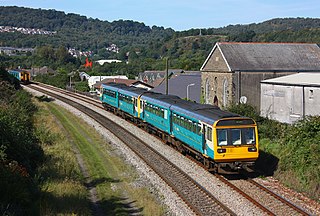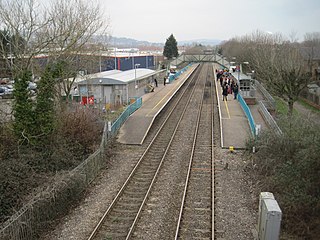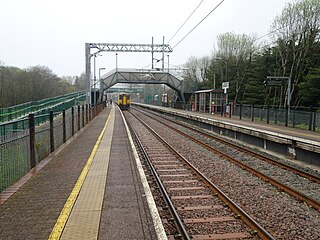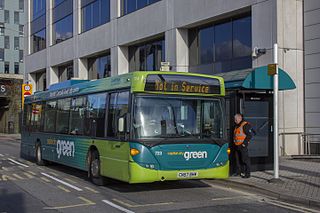
Cardiff city centre is the city centre and central business district of Cardiff, Wales. The area is tightly bound by the River Taff to the west, the Civic Centre to the north and railway lines and two railway stations – Central and Queen Street – to the south and east respectively. Cardiff became a city in 1905.

Night service, sometimes also known as owl service, is a mode of public transport service operated during the night hours. As an intermediate approach – between providing full service around the clock and stopping services altogether – it provides more limited service during times of lower passenger volume, saving resources and allowing for maintenance on primary transportation systems. They typically offer fewer routes and less frequent service. Night-based services may be differently branded compared to daytime services. Examples are London and Chicago, where overnight buses are prefixed with an "N" for "night". Another common way to distinguish night services from their daytime counterparts is dark-colored line numbers. Some cities apply a different fare structure for night services from their daytime services.

The Rhondda line, also known as the Treherbert line, is a commuter railway line in South Wales from Cardiff to Treherbert. The line follows the Merthyr line as far as Pontypridd, where it then diverges to continue along the Rhondda Valley.

Barry Docks Railway Station is one of three railway stations serving the town of Barry, South Wales. Rail passenger services are operated by Transport for Wales as part of the Valley Lines network.

Fishguard Harbour railway station serves the port of Fishguard Harbour, Wales. It is the terminus of one of the branches of the West Wales Line from Swansea. The area is also now served by Fishguard and Goodwick railway station.

Cwmbran railway station is in the northeast of Cwmbran town centre, within five minutes' walking distance. It is part of the British railway system owned by Network Rail and is managed by Transport for Wales, who operate all trains serving it. It lies on the Welsh Marches Line from Newport to Hereford. The station was opened at this site in 1986 to serve the commuter route to Newport and Cardiff, and shoppers to the town centre.

Aberdare railway station serves the town of Aberdare in Rhondda Cynon Taf, Wales. It is the terminus of the Aberdare branch of the Merthyr Line, 22½ miles (36 km) north-north-west of Cardiff Central. Passenger services are provided by Transport for Wales.

Cadoxton railway station is a railway station serving Cadoxton and Palmerstown near Barry, Vale of Glamorgan, South Wales. It is located on the Barry Branch 6½ miles (10 km) south of Cardiff Central. The line continues to the terminus of the Barry Branch at Barry Island but from Barry Junction the line also continues as the Vale of Glamorgan branch to Bridgend via Rhoose for Cardiff International Airport bus link and then Llantwit Major.

Ystrad Rhondda railway station is a railway station serving Ystrad in Rhondda Cynon Taf, Wales. It is located on the Rhondda Line. Alphabetically, it is the last station in the UK with the first being Abbey Wood station in southeast London.

Treherbert railway station serves the village of Treherbert in Rhondda Cynon Taf, Wales. It is the northern terminus of the Rhondda Line.

TrawsCambria was a network of medium and long-distance express bus routes in Wales sponsored by the Welsh Government.

First Cymru is an operator of bus services in South West Wales. It is a subsidiary of FirstGroup. With its headquarters previously in Swansea, it is now part of the First Wales and West region which also covers Bristol, Bath and Worcester, with its headquarters in Bristol. With 220 vehicles, it is the second largest bus operator in Wales after Stagecoach South Wales.
Transport in Cardiff, capital and most populous city in Wales involves road, rail, bus, water and air. It is a major city of the United Kingdom and a centre of employment, government, retail, business, culture, media, sport and higher education.

London Buses route 120 is a Transport for London contracted bus route in London, England. Running between Northolt station and Hounslow bus station, it is operated by Metroline.

Green Line routes X1 and X10 were limited-stop express coach services which were operated by Stephensons of Essex as part of the Green Line Coaches network. The services operated between Rochford, Southend and London. The original X1 route was introduced in 1980 by Southend Transport and Reading Transport, and also served Reading.
Bus transport in Cardiff, the capital and most populous city in Wales, forms the major part of the city's public transport network, which also includes an urban rail network, Waterbus and international airport. Cardiff is a major city of the United Kingdom and a centre of employment, retail, business, government, culture, media, sport and higher education.

Free b was a zero-fare shuttle bus that operated in Cardiff city centre, Wales. The route circled the edges of the city centre anti-clockwise. The service was operated by Cardiff Bus.

Capital City Red was the branding of bus services 17 and 18 in Cardiff. The route runs from the city centre to the west of the city, serving the Canton, Ely and Caerau districts.

Capital City Green was the branding of the bus service 27 Cardiff, operated by Cardiff Bus. The route ran from the city centre to the north of the city, serving the Maindy, Mynachdy, Birchgrove, Heath, Llanishen and Thornhill districts.
TrawsCymru is the brand name for a network of regional bus services in Wales, sponsored by the Welsh Government. It was introduced as a replacement for the TrawsCambria network.


















